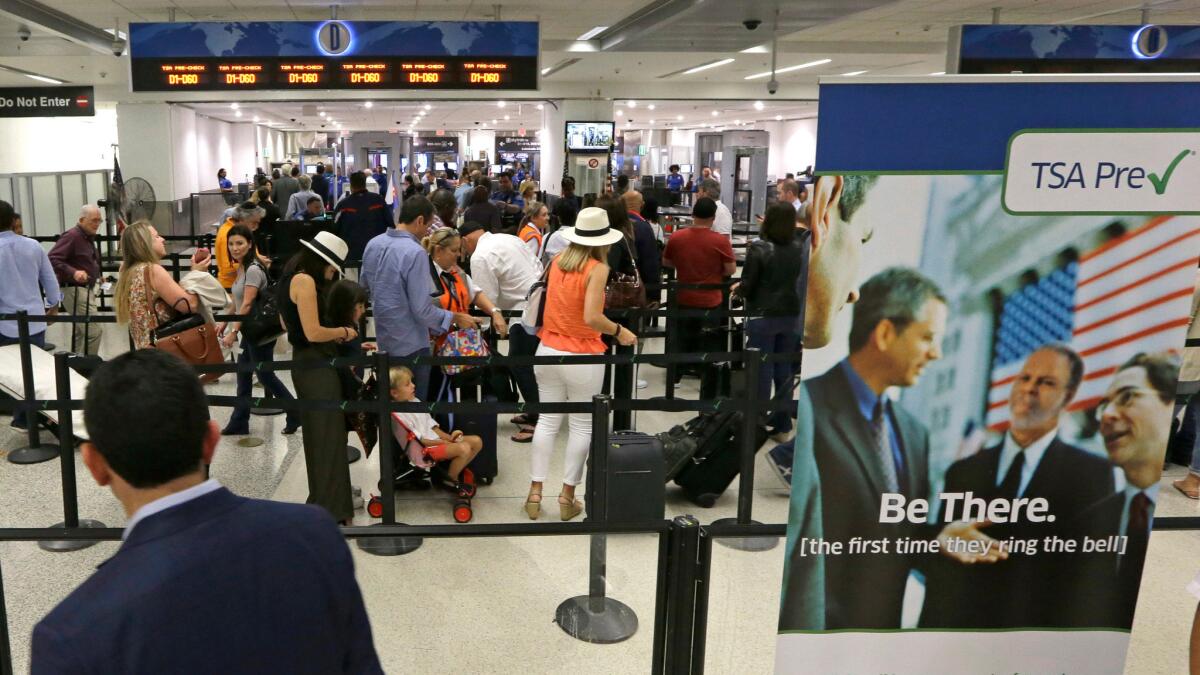Editorial: Call off the clowns and fully fund airport security

- Share via
Just how long are security lines at U.S. airports? So long that American Airlines says 70,000 of its passengers missed flights last year due to screening delays. So long that 450 of its customers missed flights in just one airport last weekend. So long, that it may now be faster to drive the 400 miles to Grandma’s house than to fly in some cases. So long that some airports have hired clowns and miniature horses to distract bored travelers.
Memorial Day is the kickoff to the busy summer travel season; some 231 million people are expected to pass through the nation’s airports between June and August. But thanks to the continued increase in the number of travelers — a 4% rise from last year is anticipated — and a shortage of staff at security checkpoints, the lines are only expected to grow.
Many passengers will take out their frustrations on the blue-shirted Transportation Security Administration agents shuttling them through waits as long as one and two hours. But screeners are probably just as unhappy about the long lines as the people stuck in them.
Frustrated travelers should instead save their ire for Congress. It was Congress that created the September 11 Security Fee in 2012, saying that the new surcharge on every passenger’s airline ticket would raise money to pay for screening and safety. But in 2013, it was Congress that diverted billions of those dollars and used the pilfered funds to pay down the federal debt.
The impact of that reduction, equal to $1.25 billion this year, wasn’t immediately apparent to the traveling public, but in the years that followed, the number of airport screeners decreased by nearly 5,000, or 12%. During the same period, the volume of people passing through checkpoints increased from 643 million to 694 million. This year, 740 million people are expected to pass through airport security checkpoints.
It doesn’t take an aerospace engineer to figure out that this is a formula for chaos, confusion and delay, even before you factor in the enhanced security measures that have been added in recent months to address new terrorist threats and the appalling security lapses found by undercover investigators last year. (Remember? Airport screeners failed to detect explosives, weapons and other banned material in 67 out of 70 tests conducted by a Department of Homeland Security undercover team at dozens of airports.)
Members of Congress must be bad at math or perhaps suffer from short-term memory loss, because they were outraged when the predictable crunch materialized this year, culminating last weekend in that lines grew so long at Chicago’s O’Hare airport that 450 people missed their flights and were stranded overnight. Washington’s response was to throw a bone to the TSA – a paltry $34 million to hire 768 moresecurity agents. That’s fewer than than two new agents for each of the U.S. airports served by the TSA.
“Congress will not sit back while the situation gets worse,” Rep. Michael McCaul (R-Texas), chairman of the House Homeland Security Committee, said with a straight face on Wednesday before grilling TSA chief Peter Neffenger about what steps he is taking. McCaul chalked up security problems to a “weaker” TSA.
Neffenger, a former vice admiral in the U.S. Coast Guard, might have remind the committee members of their complicity in TSA’s staffing situation. Instead, he focused on all the steps he’s taken since assuming control at the troubled agency not quite a year ago: retraining and redeploying staff, management changes (the day before testifying, he had replaced the head of security operations), working with airlines and airports to make security lines more efficient, trying to get more people to pay $85 for PreCheck, an expedited security program that so far has failed to attract as many participants as expected.
That’s all great, but it’s not enough to counter years of disinvestment. The TSA needs money to build up staff to accommodate surging air travel. If Congress is serious about homeland security, it must not continue to pay lip service to the idea while raiding the money meant to pay for it.
Follow the Opinion section on Twitter @latimesopinion and Facebook
More to Read
A cure for the common opinion
Get thought-provoking perspectives with our weekly newsletter.
You may occasionally receive promotional content from the Los Angeles Times.









